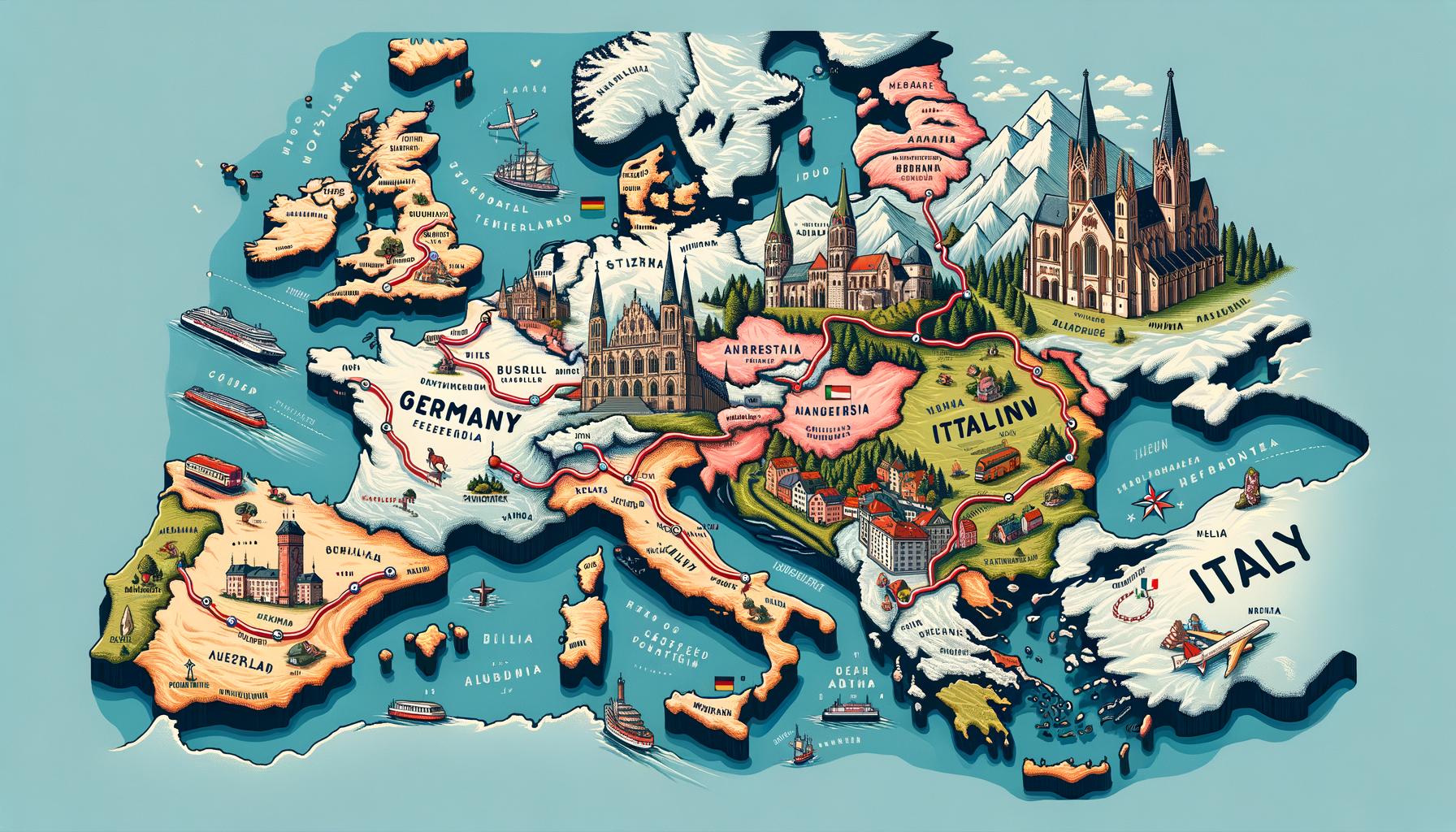Are you wondering if you can travel from Germany to Italy? Whether you’re a lover of picturesque train journeys, eager to explore the best scenic driving routes, or simply looking for the most budget-friendly options for your journey – this article will cover all the travel options available for adventurers wishing to make their way from Germany to Italy.
From air travel and train rides to road trips and bus rides, we’ll provide you with everything you need to know about each mode of transportation for your journey.
If you’re considering a trip from Germany to Italy, you may be wondering about the best way to embark on your adventure. Fortunately, there are several convenient and efficient transportation options available. In this comprehensive guide, we’ll take a closer look at traveling by air, train, car, and bus from Germany to Italy – including some important COVID-19 restrictions that may impact your plans.
From direct flights and scenic train routes to road trip tips and budget-friendly bus options, there is no shortage of travel choices when it comes to making your way from Germany to Italy. However, before you set out on your journey, it’s essential to consider various factors such as travel restrictions due to COVID-19 and visa/passport requirements.
This article will provide valuable information that can help ensure a smooth and enjoyable trip for anyone traveling from Germany to Italy.
Travel by Air
If you’re wondering, “can you travel from Germany to Italy,” the answer is yes – and one of the most popular ways to do so is by air. Many airlines offer direct flights between major cities in Germany and Italy, making it convenient for travelers to hop between the two countries. Whether you’re departing from Berlin, Frankfurt, Munich, or another German city, there are several options for getting to Italy by air.
Direct Flights and Airlines
When it comes to traveling from Germany to Italy by air, there are numerous direct flights available from major airports such as Berlin Brandenburg Airport, Frankfurt Airport, and Munich Airport. Airlines such as Lufthansa, Alitalia, EasyJet, and Ryanair offer direct flights between the two countries, with a variety of departure times and price points to suit different budgets and schedules. It’s recommended to book your flight in advance to secure the best deals on airfare.
Travel Tips
To make the most of your travel by air from Germany to Italy, consider some travel tips that can enhance your journey. For example, packing light can save you time at the airport and may even help you avoid checked baggage fees. Additionally, familiarize yourself with any COVID-19 travel restrictions or requirements that may be in place for international travelers flying into Italy.
Lastly, consider joining a frequent flyer program with an airline that operates routes between Germany and Italy – this could earn you valuable perks on future flights. By considering these tips before your trip, you can streamline the process of traveling by air from Germany to Italy.
Travel by Train
Traveling from Germany to Italy by train offers a unique and scenic experience for travelers. With the convenience of avoiding airport security and the opportunity to enjoy breathtaking views along the way, taking the train is a popular option. There are several routes available, each offering its own charm and appeal.
One of the most popular train routes from Germany to Italy is the Munich to Venice route. This journey takes passengers through the picturesque landscapes of the Austrian Alps, offering stunning views of mountains, lakes, and charming villages along the way. The train ride also allows travelers to relax and take in the scenery without having to worry about driving or navigating unfamiliar roads.
Another notable route is the Zurich to Milan journey, which takes passengers through the Swiss Alps, providing unparalleled views of snow-capped peaks and lush valleys. This route is a favorite among nature enthusiasts and photographers, as it showcases some of Europe’s most beautiful natural landscapes.
For those looking for a longer and more immersive train experience, consider taking the Berlin to Rome route. This multi-day journey allows passengers to witness the diverse landscapes of central Europe and northern Italy, from rolling hills and vineyards to historic cities and coastal towns.
When traveling by train from Germany to Italy, it’s important for passengers to check for any potential COVID-19 travel restrictions, as well as visa and passport requirements. Additionally, booking tickets in advance can help secure preferred seating options and ensure a smoother travel experience.
| Train Route | Highlights |
|---|---|
| Munich to Venice | Austrian Alps, charming villages |
| Zurich to Milan | Swiss Alps, snow-capped peaks |
| Berlin to Rome | Rolling hills, historic cities |
Travel by Car
Traveling from Germany to Italy by car offers a unique and flexible way to explore the beautiful landscapes and charming towns along the route. The journey can be broken down into several manageable driving days, allowing travelers to make stops at various must-see destinations along the way. Some popular routes for driving from Germany to Italy include the Brenner Pass, Gotthard Tunnel, and Grossglockner High Alpine Road.
One of the key road trip tips when traveling from Germany to Italy is to ensure that your vehicle is in good condition before embarking on the journey. It’s important to have basic knowledge of driving rules and regulations in both countries, as they may differ in terms of speed limits, toll roads, and road signage. Additionally, having a GPS or map is essential for navigation, especially when exploring smaller towns and rural areas.
There are numerous must-see stops when traveling from Germany to Italy by car. In Germany, cities such as Munich and Nuremberg offer rich history and culture, while the Black Forest region provides stunning natural beauty.
Once in Italy, stop at picturesque Lake Garda or visit the medieval town of Verona, famous as the setting for Shakespeare’s Romeo and Juliet. As travelers venture further south, they can explore iconic Italian cities including Florence, Pisa, and ultimately reach their final destination – the historic city of Rome.
| Must-See Stops | Description |
|---|---|
| Munich | Rich history and culture in Bavaria |
| Lake Garda | Picturesque lake with charming lakeside towns |
| Florence | Famous for its Renaissance art and architecture |
Travel by Bus
Traveling from Germany to Italy by bus can be a budget-friendly option for those looking to explore the beautiful country. There are several bus companies that offer routes from major cities in Germany to popular destinations in Italy, making it an accessible and affordable travel choice for many.
Bus Companies and Routes
When traveling from Germany to Italy by bus, there are several reputable bus companies that offer routes between the two countries. Some of the most popular companies include FlixBus, Eurolines, and MarinoBus. These companies provide comfortable and reliable buses that connect major cities such as Munich, Berlin, and Frankfurt with cities in Italy like Milan, Florence, and Rome.
Benefits of Traveling by Bus
Traveling by bus offers a few benefits that may appeal to budget-conscious travelers. First and foremost, taking the bus can often be more affordable than flying or taking the train.
Additionally, buses provide a more scenic way to travel, allowing passengers to enjoy the picturesque landscapes as they make their way from Germany to Italy. Another advantage is the flexibility of bus travel – passengers can easily stop in smaller towns or villages along the route, adding a unique touch to their Italian adventure.
Tips for Bus Travel
Before embarking on a bus journey from Germany to Italy, it’s important to consider a few tips for a smooth and enjoyable trip. It’s recommended to book tickets in advance, especially during peak travel times or holidays when buses may fill up quickly.
Additionally, travelers should familiarize themselves with the specific luggage policies of each bus company to ensure a hassle-free experience. Lastly, bringing snacks and entertainment for the journey can help pass the time during longer trips.
Overall, traveling from Germany to Italy by bus provides an affordable and flexible option for those looking to explore all that Italy has to offer. With various routes available and the potential for memorable stops along the way, taking the bus can be a unique and enjoyable way to experience both countries.
COVID-19 Travel Restrictions
As of 2021, travelers are still facing restrictions and regulations due to the ongoing COVID-19 pandemic. Before planning your trip from Germany to Italy, it is crucial to be aware of the latest travel restrictions and requirements. Below are some important points to consider:
- COVID-19 Testing: Travelers entering Italy from Germany may be required to present a negative PCR test result taken within a certain timeframe before their arrival.
- Quarantine Measures: Depending on the current situation, travelers from Germany may need to quarantine upon arrival in Italy. It is essential to stay updated on the latest quarantine requirements and guidelines.
- Vaccination Status: Italy has implemented a “Green Pass” system which allows vaccinated individuals or those who have recovered from COVID-19 to have certain privileges. Travelers should familiarize themselves with these rules and how they may affect their trip.
In addition to these measures, it’s advisable for travelers to regularly check official government websites and airline updates for any changes in travel restrictions. Keep in mind that regulations can vary based on individual circumstances such as vaccination status or specific regions within Italy.
Moreover, it’s important for travelers to also consider any restrictions or requirements that may apply when returning from Italy to Germany. This could include mandatory testing, quarantine rules, or other health protocols mandated by German authorities.
Overall, while it can be challenging to navigate the current travel landscape, being well-informed and prepared can help ensure a smooth journey from Germany to Italy during these unprecedented times.
Visa and Passport Requirements
When traveling from Germany to Italy, it’s important to be aware of the visa and passport requirements before you go. This section will provide you with the essential information you need to ensure a smooth and hassle-free travel experience.
Visa Requirements
For citizens of Germany, as well as other Schengen Area countries, a visa is not required for short stays in Italy. You can stay in Italy for up to 90 days within a 180-day period without needing a visa. However, it’s crucial to double-check this information before your trip as visa requirements may change.
Passport Requirements
When traveling from Germany to Italy, you will need a valid passport. It’s important to ensure that your passport is valid for at least three months beyond your planned date of departure from the Schengen area. If your passport does not meet these requirements, you may be refused entry into Italy.
COVID-19 Travel Restrictions
In light of the ongoing COVID-19 pandemic, there may be additional travel restrictions and requirements when traveling from Germany to Italy. It’s essential to stay updated on the latest travel advisories and guidelines issued by both the German and Italian governments regarding entry and quarantine requirements.
By familiarizing yourself with the visa and passport requirements for traveling from Germany to Italy, as well as staying informed about any COVID-19 related travel restrictions, you can ensure a hassle-free journey and focus on enjoying all that Italy has to offer.
Final Thoughts
In conclusion, there are multiple options for traveling from Germany to Italy, depending on your preferences and priorities. Whether you prefer the speed and convenience of air travel, the scenic routes and relaxation of train travel, the flexibility and adventure of a road trip, or the budget-friendly option of taking a bus, there’s a mode of transportation that can suit your needs.
However, it’s important to keep in mind the current COVID-19 travel restrictions and regulations when planning your trip. Be sure to stay updated on any requirements for testing, quarantine, or vaccination that may be in place for travelers between Germany and Italy. Additionally, it’s crucial to check visa and passport requirements before your journey to ensure a smooth and hassle-free experience.
Ultimately, traveling from Germany to Italy offers an incredible opportunity to explore two diverse and culturally-rich countries. Whether you’re drawn to Italy’s art, history, and cuisine or excited to discover Germany’s stunning landscapes and vibrant cities, this journey can provide unforgettable experiences. With careful planning and preparation, you can make the most of your trip while creating lasting memories. Safe travels.
Frequently Asked Questions
Can I Go From Italy to Germany?
Yes, you can travel from Italy to Germany by various means such as train, plane, or car. There are direct train services available between major cities in both countries, making it relatively easy to make the journey.
Is Italy Close to Germany by Train?
The distance between Italy and Germany can be covered by train, but the travel time varies depending on the starting and ending points. For example, the high-speed rail service connects Munich and Milan in around 7 hours, making it a convenient option for travelers looking to move between the two countries.
What Is the Closest Italian City to Germany?
The closest Italian city to Germany is Bolzano, also known as Bozen, which is located in the northern part of Italy near the border with Austria. It is situated in a region that has historical ties to both Italian and German-speaking cultures, making it an interesting destination for those looking to explore the cultural diversity of this area.

I’m a passionate traveler, writer, and Italophile. My fascination with Italy’s history, art, and culture has led me on countless adventures across the Italian landscape. Through “I Live Italy,” I share my love for this extraordinary country and aims to inspire others to explore its boundless beauty.





